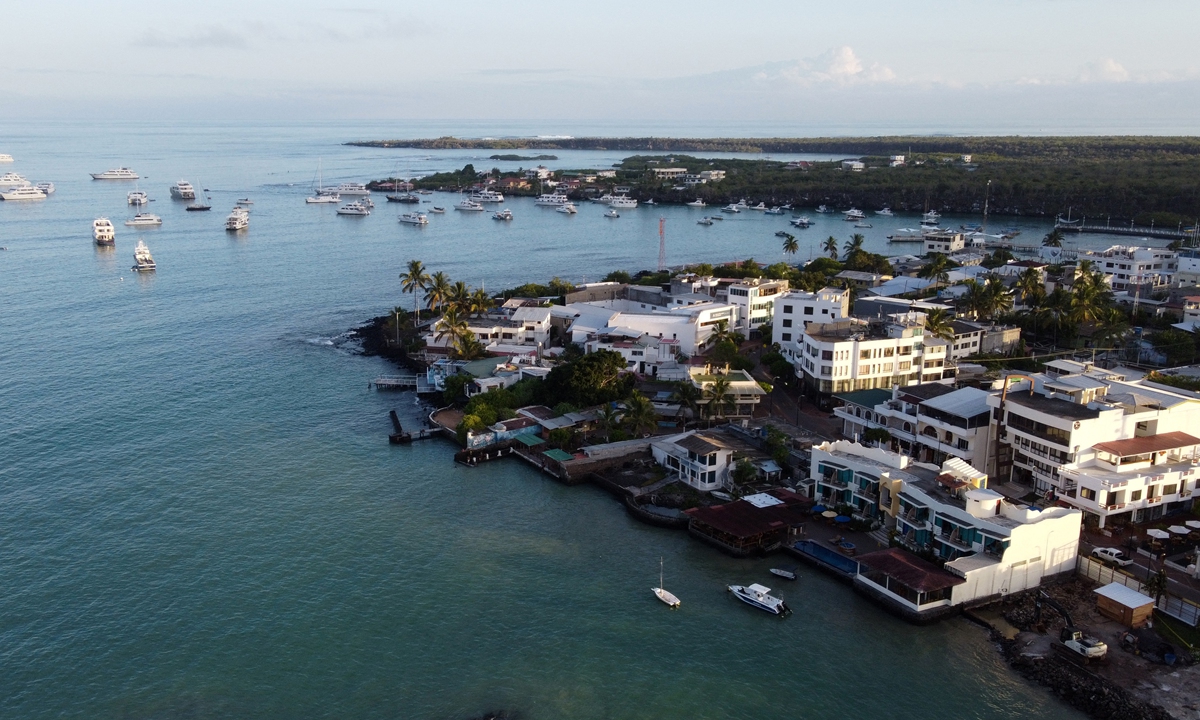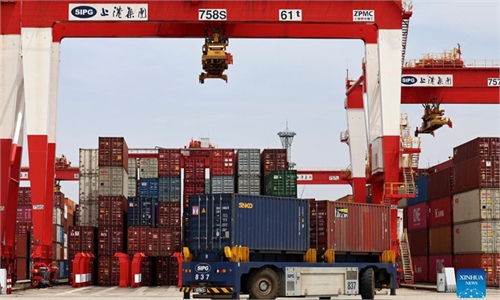Exclusive: Foreign media gives one-sided story after cracks found in China-built hydropower plant: Chinese Embassy in Ecuador

Boats dock off the coast of Santa Cruz Island in the Galapagos, Ecuador on April 15. Photo: AFP
Cracks found in a China-built hydropower plant in Ecuador will not affect its operation and safety, and the plant is safe for its 50-year design life, but some foreign media outlets have produced one-sided reports that do not give the full picture of the situation, the Chinese Embassy in Ecuador told the Global Times on Wednesday.
The Embassy's response came after that some foreign media outlets including The Wall Street Journal reported that Coca Codo Sinclair hydroelectric plant, Ecuador's largest hydropower plant, could break down due to "thousands of cracks."
According to The Wall Street Journal, since the 2016 opening, officials from the state electricity utility have found more than 17,000 cracks in the power plant's eight turbines, according to the state utility. It blames the fissures on faulty steel imported from China.
The officials said in response to questions from The Wall Street Journal that no crack is acceptable, and they could result in the equipment losing its structural integrity, causing it to collapse.
Regarding the partial cracks on the inner surface of the water distribution ring pipe of the hydropower project, the Chinese Embassy in Ecuador said that the problem has been assessed by an international third-party independent testing agency TUV SUD, which concluded that it will not affect the operation and safety of the unit and that the plant is safe for its 50-year design life.
"It should be noted that the report did not interview all the parties involved, and the statements are not the full picture of what happened. In addition, it mixes together some issues that are not directly related, such as the relationship between the construction of the power plant and the preliminary design and later river erosion, giving people the illusion that it is all the fault of Chinese enterprises," the Embassy noted.
Coca Codo Sinclair Hydropower Station is the largest hydropower plant ever constructed in Ecuador as well as a landmark project of China-Ecuador bilateral cooperation. The project has an installed capacity of 1.5 million kilowatts with an EPC contract value of $1.98 billion, most of which is financed by the Export-Import Bank of China, according to the Embassy.
Up to now, the cumulative power generation of the power plant has exceeded 40 billion kilowatt hours, accounting for more than 30 percent of the national power generation in Ecuador. It not only effectively eases the demand for electricity, optimizes the electricity structure of the country and brings light to thousands of households across the country, but also helps the country transform from a power importing country to a power exporting country and achieve foreign exchange earnings, the Embassy stressed.
At the end of 2018, the Chinese and Ecuadorean governments signed a Memorandum of Understanding on the joint construction of the Belt and Road Initiative, which has further deepened the practical cooperation in various fields between the two sides.
Driven by strong bilateral relations and Chinese investment and financing, Chinese enterprises have actively participated in the development of strategic areas such as electricity, transportation and oil and mining, as well as the construction of hospitals, housing, schools and other quality of life projects, creating thousands of jobs every year and bringing significant economic and social benefits to the country, which has strongly contributed to the economic recovery and improvement of living standards in Ecuador, the Embassy said.
In addition, the negotiations between China and Ecuador on a bilateral free trade agreement (FTA) have proceeded smoothly, Mao Ning, Chinese Foreign Ministry spokesperson, said on January 4 during a press conference.
With the deal, Ecuador's exports will receive preferential access to China, and the South American country's manufacturers will be able to acquire machinery and other products at a lower cost.

